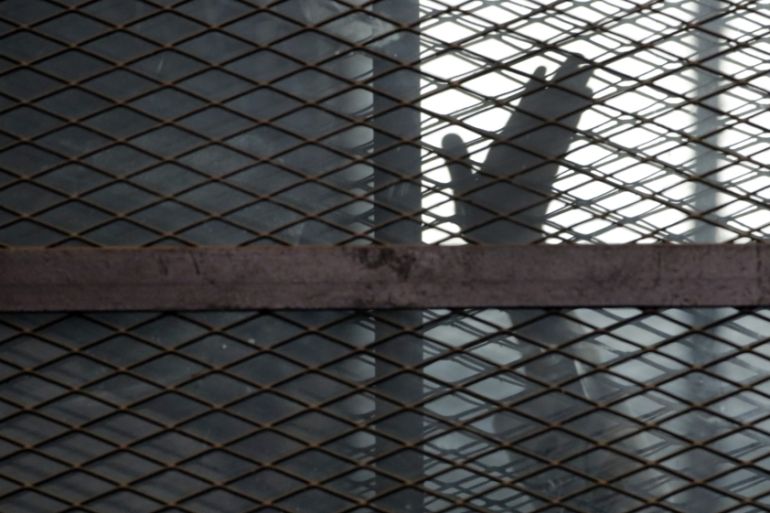Mass hunger strike at Egypt’s infamous Scorpion prison
More than 30 inmates held at “Egypt’s Guantanamo” refusing food to highlight inhumane conditions, including beatings.

At least 32 prisoners held inside one of Egypt’s most notorious jails have gone on a mass hunger strike to highlight alleged abuses, including the beating of family members who come to visit.
Dubbed by activists “Egypt’s Guantanamo”, prisoners at the maximum security al-Aqrab prison about 20km south of Cairo began refusing food last month, according to a group of family members of al-Aqrab detainees.
Keep reading
list of 4 items‘Mama we’re dying’: Only able to hear her kids in Gaza in their final days
Europe pledges to boost aid to Sudan on unwelcome war anniversary
Birth, death, escape: Three women’s struggle through Sudan’s war
The organisation, which documents the status of prisoners in al-Aqrab, told Al Jazeera that a series of violations took place this year inside al-Aqrab, including several assaults by prison guards on inmates – as well as against their family members.
The alleged beatings triggered a few prisoners to go on a hunger strike on February 24 who were later joined by more than two dozen other inmates. They say they will continue refusing food until their demands to improve conditions are met.
Related: Inside Egypt’s prisons
Gehad el-Haddad, former media spokesman for the Muslim Brotherhood, was one of the first to go on a hunger strike.
Members of the Muslim Brotherhood faced a major crackdown by Egyptian authorities after the toppling of former President Mohamed Morsi. El-Haddad has been in al-Aqrab since January 25, 2014.
His wife, Basma Mahmoud, told Al Jazeera he’s not asking to be released, just for humane conditions inside the prison.
“He’s asking for basic living necessities. Asking for edible food, for basic medical care… For family visitations with no glass in between. Even clothes, we’re in the winter and they’re wearing very light clothes,” Mahmoud said.
|
|
| UN journalists call for release of AJE staff |
The demands by the hunger-strikers include weekly visits from family members that last an hour without glass partitions, improving the quality of food and water, allowing families to bring food, medicine and clothing for them, and daily excercise sessions.
The families’ group says the current conditions at al-Aqrab do not comply with Egypt’s prison laws.
Mahmoud, who last saw her husband on February 29, said she and other visitors had to camp outside the prison the night before in order to see the inmates.
“To visit him, I had to be there in front of the prison from 8pm the night before so that I can see him the
next day at 2pm – for just two minutes,” she said.
The Arabic hashtag “Aqrab Hunger Strike” recently trended in Egypt, in addition to the #DyingToLive hashtag, which has gained some traction online.
#DyingToLive#اضراب_العقرب#مقبرة_العقرب#مصر#Egypt pic.twitter.com/HePrc19NyQ
— Marwa Diaa (@MarwaDiaa1) March 3, 2016
Last month, dozens of people demonstrated in front of the headquarters of Egypt’s journalist syndicate protesting conditions that their imprisoned relatives face inside al-Aqrab.
Yasmin Ahmed was at the demonstration. Her brother is currently imprisoned at al-Aqrab – or Scorpion in Arabic – and has been held there for the last eight months on charges of “spreading news that harms national security” – charges she says have no basis.
“He was fine before, but since his al-Aqrab imprisonment, he now suffers from colon issues, kidney sickness, and strong joint pain,” she told Al Jazeera.
She also repeated her brother’s account of the conditions inside the cells, saying most are overpopulated.
“The prison cells are only big enough for one person, but they’ll squeeze in three or four people together. There is a small squat toilet which the prisoners have to ask their fellow inmates to look away when they use it,” Ahmed said.
Read More: Egypt’s Sisi promises laws to tackle police brutality
In recent law amendments made by Egyptian President Abdel Fattah el-Sisi, the head of the prison service is required to be notified of any prisoner hunger strikes immediately.
Mahmoud, Gehad al-Haddad’s wife, alleged that “high-ranking” interior ministry officials made death threats against her husband and other prisoners for going on the hunger strike.
Al Jazeera contacted the interior ministry for comment, but did not receive a reply by publication time.
Mohamed Gameel, head of the Arab organisation for human rights in the UK, said the hunger strikes are directed by the prisoners at the international community.
“The Egyptian government won’t take action till it finds itself facing strong pressures from the international community,” he told Al Jazeera.
A report released by Amnesty International documents prisoner abuse – including beatings and deaths – by Egyptian authorities.
The report also estimates that in 2015, 3,000 civilians stood trial. Amnesty said “military trials of civilians are fundamentally unfair”.
|
|
| Al Jazeera journalist relishes reunion with family |